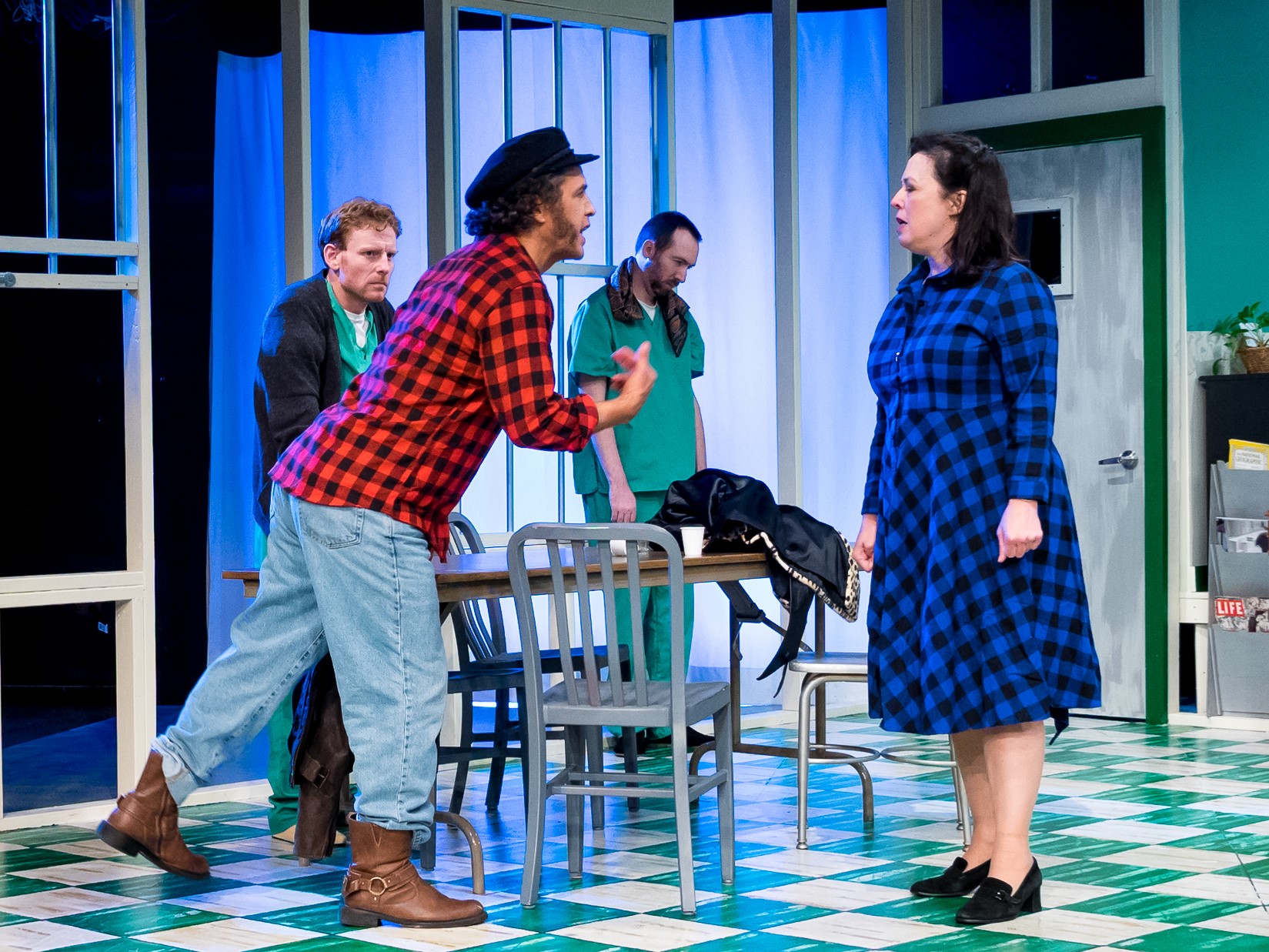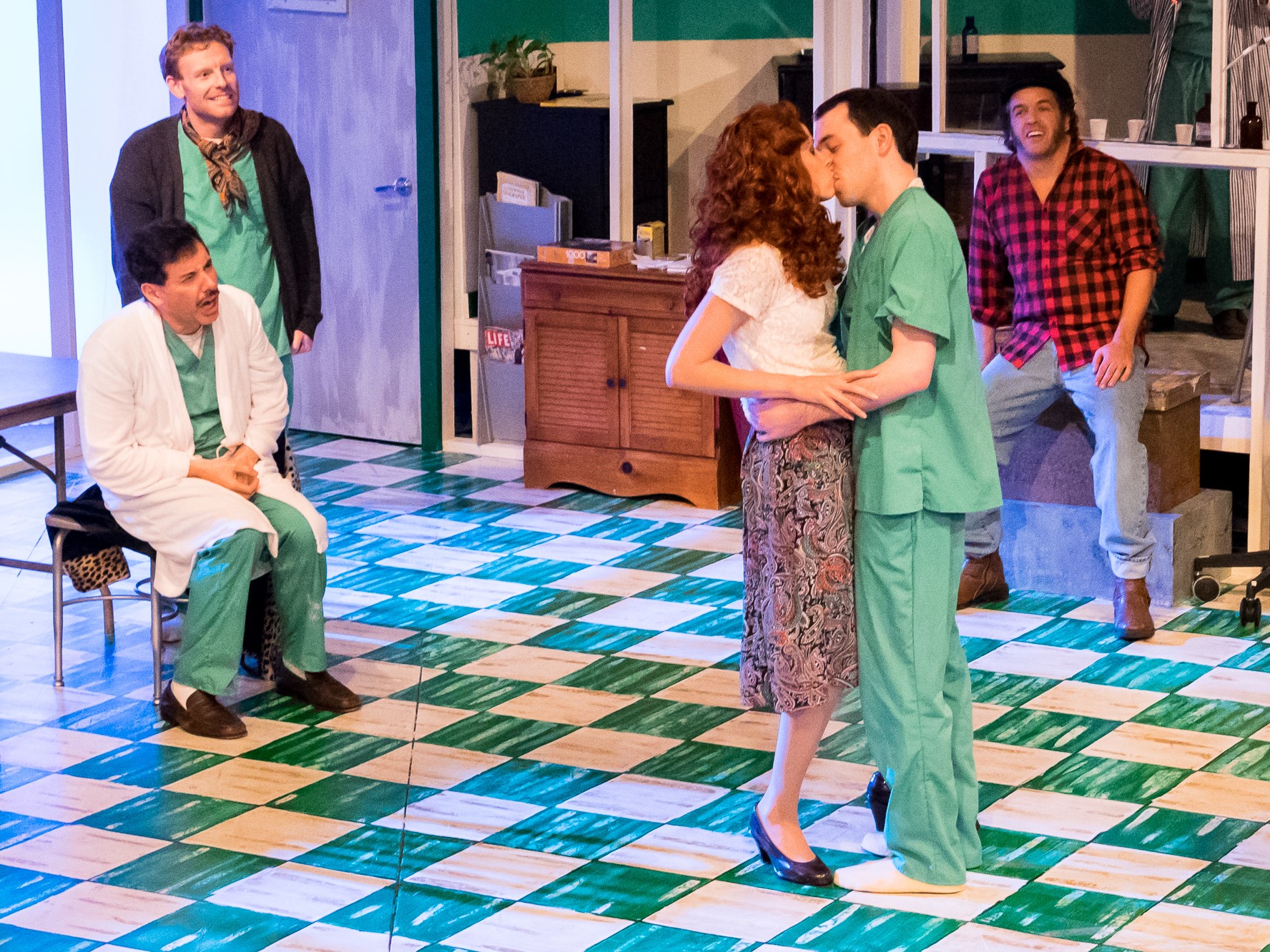Review of One Flew Over the Cuckoo’s Nest, Playhouse on Park
Randle Patrick McMurphy is a famed character—from Ken Kesey’s novel One Flew Over the Cuckoo’s Nest (1962) to the play Dale Wasserman made from the novel a year later, to the film by Miloš Forman, using Bo Goldman’s screenplay, the role for which Jack Nicholson won a Best Actor Oscar in 1975. Kesey and Wasserman were free spirits, anti-authoritarian, extra-institutional, and they fashioned McMurphy to be a protean Everyman type—boisterous, crude, full of the life principle. He’s a charmer and not nearly as clever as he’d like to be, naïve in ways that prove to be his Achilles’ heel.
It’s as if we’ve always known McMurphy and have never stopped wishing him well. But, these days, a certain tangled air encircles him. The life principle, as conceived in the book-play-film, is decidedly male, and it’s set against the ball-busting, castrating, emasculating power wielded by a society that—in the name of motherhood, religion, manners, and being nice—suppresses the raw “barbaric yawp” that American heroes so often sound. These days, politesse is all but dead, and many forms of misogyny, some subtle and some overt, have been hash-tagged if not debagged. Cuckoo’s Nest, now, could even seem a “backlash,” or at least a cautionary tale about how badly “real men” fare beneath the thumb of a culture determined to outlaw their badass antics.
Randle Patrick McMurphy (Wayne Willinger) and Nurse Ratched (Patricia Randell), foreground; Dale Harding (Adam Kee), Ruckley (Ben McLauglin), background; in Playhouse on Park’s production of One Flew Over the Cuckoo’s Nest (photos by Curt Henderson)
If you don’t know the story: there is an asylum where a group of male inmates live out their days medicated and playing cards and watching TV and taking recreation according to a prescribed schedule. Many elements of life in the common space are by agreement, ostensibly, but all is overseen by Nurse Ratched, a figure of authority who treats the patients as children trying to get away with something. They can’t be trusted and they don’t trust themselves, since most suffer from extreme social anxieties. One or two “chronic” patients are too debilitated to take part in common functions, most notably “The Chief,” a very large Native American who appears to be catatonic, but in fact is a source of stream-of-consciousness commentary about the ward.
Into this world of settled routine comes McMurphy, a repeat-offender sent over from prison for an intervention into his violent and anti-social tendencies. To him, the asylum beats lock-up and he’s soon engaging the inmates in card games and wagers to leech their government checks away. He is an unregenerate hustler and the anathema of Nurse Ratched who resents how easily McMurphy’s charm sways her patients and even Dr. Spivey, the doctor assigned to the ward who previously agreed with her if only to avoid confrontation.
As revived at Playhouse on Park, directed by Ezra Barnes, whose The Diary of Anne Frank there was a notable success last season, Cuckoo’s Nest takes too long to click and never soars. The play picks up momentum as it goes, with the first half weighed down with the task of introducing characters and the elements of life in the asylum. The second half comes more fully into its own as the camaraderie among the inmates of the asylum catches fire and makes their interplay more interesting, while the battle of wills between Ratched and McMurphy becomes more pronounced.
The principle characters are particularly well cast. As McMurphy, Wayne Willinger has plenty of swagger and charm, and busy eyebrows reminiscent of Nicholson. Willinger never lets us forget—for all the heroizing of his fellow inmates—that McMurphy is just an average guy, mostly flying by the seat of his pants. His main delight is going against the rules simply because they are rules. The others, against whatever comfort they find in routine, eventually start to see his point, but it does take a while. The Act One closer is the first breath of fresh air: a collectively imagined baseball game on a shut-off TV.
As Big Nurse Ratched, Patricia Randell is perfect. Randell looks a motherly figure and acts like a school principal: no-nonsense, and convinced of the value of the particular brand of socialization she wields. Her “all right, boys,” at one point, risks a certain devilry. We might suspect that, in other circumstances, she might be a bit more indulgent toward McMurphy, but his cock-of-the-walk routine has to be squelched. Of course, there will be violence and a sacrificial victim.
Santos, in the role of Chief Bromden, plays up the outward debility of the character. The Chief, for all his size and latent power, sees himself as dwarfed by the system that has robbed his tribe of all status and respect. His voice carries a gravitas that does much for the allegory Kesey and Wasserman intended. This isn’t ever meant to be simply a therapeutic institution but rather a metaphor for how we self-medicate ourselves into complacency for the sake of a quiet life without complications. All the inmates are afraid of life “out there,” and all but a few, including the Chief and McMurphy, are free to leave if they wish. But they don’t.
Dale Harding (Adam Kee), Frank Scanlon (John Ramaine), Candy Starr (Athena Reddy), Billy Bibbitt (Alex Rafala), Randle Patrick McMurphy (Wayne Willinger)
Part of the problem here is with the patients. They risk becoming tics of behavioral oddity, and to make them characters would take more time than the play can afford. The neuroses from which they suffer fall away rather quickly and some—most notably Harding (Adam Kee)—seem perfectly fine from the start. The era when one sought out psychiatric—or medical—intervention for homosexuality is, thankfully, long gone, our current vice president notwithstanding. Wasserman, who died in 2008 at 94, unfortunately never updated the play for the twenty-first century.
Barnes uses the playing space well, with the action moving around the set convincingly, including circled discussions, card games, fights, a party, and an improvised basketball game. The use of see-through walls in David Lewis’ set works very well and suggests how porous this asylum is. Lighting, which the script can be very definite about, is used to good effect by Aaron Hochheiser.
Whatever the intentions of the revival, the play comes across as a period piece, a fight for the souls of males of the Vietnam era. However, the climax—with the Chief’s big moment—takes on more potency today as a gesture against the white man’s world and its clinical devaluation of persons of color. In that, the play is of its time but also ahead of its time.
Chief Bromden (Santos)
One Flew Over the Cuckoo’s Nest
By Dale Wasserman
Based on the novel by Ken Kesey
Directed by Ezra Barnes
Scenic Designer: David Lewis; Costume Designer: Michele Sansone; Lighting Designer: Aaron Hochheiser; Original Music & Sound Designer: Lucas Clopton; Stage Manager: Mollie Cook; Properties & Set Dressing: Eileen OConnor; E. John McGarvey for Les Cheveux Salon
Cast: Katya Collazo; Andrew R. Cooksey, Jr.; Harrison Greene; Justin Henry; Adam Kee; Rick Malone; Ben McLaughlin; Alex Rafala; John Ramaine; Patricia Randell; Athena Reddy; Santos; David Sirois; Lance Williams; Wayne Willinger
Playhouse on Park
October 31-November 18, 2018


